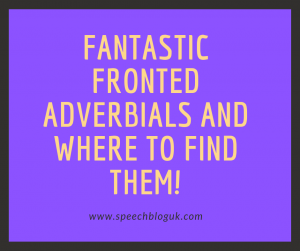Fronted adverbials. Conjunctions. Determiners. These are just some of the fantastic pieces of technical vocabulary that all children in the UK need to know for their year 6 SATS. Now unless you have taken a linguistics degree, the chances are you don’t know what these words mean, which can make helping with homework very hard.

Children with language difficulties within mainstream schools are also expected to learn these words, be able to give examples and find them in written sentences. I find I spend quite a bit of time in years 5 and 6 working on them. We may not get all the way to determiners, but we can still help children understand these words and in turn use them to make better sentences. So, here we go!
- Verbs. These are ‘doing words’ meaning they tell us what’s happening or what the person is doing or feeling. This includes words such as run, jump, shuffle, whisper, love etc. It also includes words that are about your state of being e.g. am, are, to be or to have. These last few can be harder to teach and spot. For more ideas on teaching verbs read our post here
- Nouns. These are the names of people, things, animals, places or ideas etc. If you want to get technical there are common nouns which are more general names (e.g. woman, certificate, table). Common nouns do not have a capital letter. Then you have proper nouns which are specific names (e.g. Bob, London, Eiffel Tower). These always have a capital letter.
- Pronouns. These are words that can replace a noun doing the verb e.g. he, she, it, they, one, you. For more ideas on working on he and she, read this post.
- Adjectives. Now these are describing words. They describe the noun in the sentence. Children often use colour and size words first e.g. big, red. They often need help thinking about the feel or properties of an item e.g. smooth, metal, delicious, sparkly etc. For more ideas on adjectives, read this post
- Adverbs. These mainly describe the verb but can add to other word types as well. They qualify where, when, how, in what manner and to what extent something happens. They sometimes have -ly at the end but not always! They include words such as quickly and hungrily but watch out for tricky ones like always and everywhere. For more ideas, read this post.
- Fronted adverbials. So although this sounds horrible, it just means putting an adverb at the start of your sentence e.g. Quickly, I rushed out the door or Everyday I drive my car. They can also include phrases at the start of a sentence e.g. All night long or As fast as he could.
- Prepositions. They link the nouns and pronouns and often tell us about the place or position of an item. They include words such as under, over, between, against. For more ideas start with this post
- Conjunctions. Sometimes called connectives, but I think most schools have changed to conjunctions now. These are the words that link sentences or ideas together. They include easier examples such as and, but, because. Also harder examples such as although, nor, after. Read this post for more ideas.
- Determiners. I don’t often get to teach this one! They go before the noun to clarify it. This means words such as many, the, a, their and also includes numbers e.g. twenty, one.
So that was a lightening speed run through the different word types! If you would like more posts on these and how we teach them, just let us know.






Leave a Reply